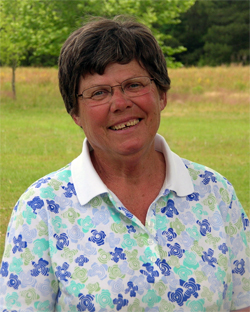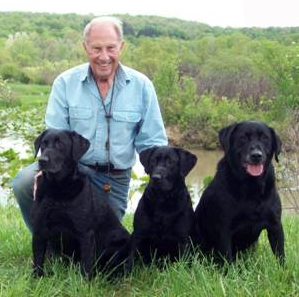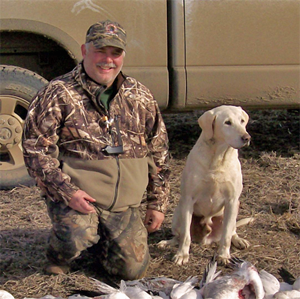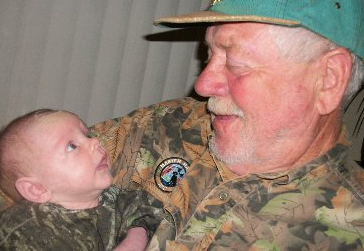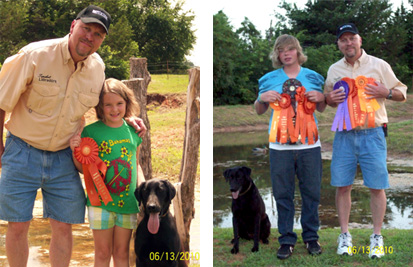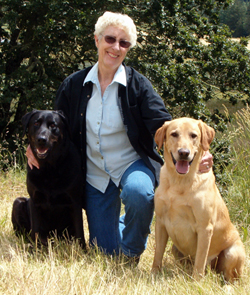My first professional career was teaching and coaching athletics. My second was property manager in the family’s Century 21 Office. My third and most enjoyable career was training Gun Dogs and running Hunt Tests. I have been retired for10 years and I live in Hampstead, NC with my husband, Sidney and our five Chessies.
We are active members in the Lumber River Retriever Club and enjoy running and judging AKC Hunt Tests. Needless to say, I am honored to be on this year’s Master National Judges’Panel. And I wish to thank those clubs in Region I for giving me this wonderful opportunity.
In 1981 we purchased our first Chessie and began running Field Trials. At that time we belonged to the Tar Heel Retriever Club and became active board members. When the AKC introduced its Hunt Test Program, we initiated and ran that program for Tar Heel. When the Master National Retriever Club was being organized, we became charter members.
I qualified to attend my first MN in 1993 and continued the next eleven years qualifying our dogs to attend. During that time I entered and handled eight MN events and passed 6. I also volunteered to work and believe I have held all jobs. In 2005 I was appointed to the Board of Directors, served as President in 2007 and was Ex Officio ( Traffic Chair) in 2008.
Over the years I have judged frequently at all levels and I feel that dogs qualifying for the MN should be exceptional in all areas of work. The dogs and handlers should work together as a well tuned team. The dogs must mark the falls and stay in the area of the fall as they hunt. When a whistle blows, the dogs should respond immediately, preferably at the first command.
Dogs should show enthusiasm but also be steady to shot and on the honor. They should enter the water without hesitation and challenge any and all obstacles presented in marks and blinds. And when the birds are delivered to hand, the release should be smooth and polite. And finally, when the dog has finished it’s work, I ask myself, “Do I want to hunt with this team?”
I believe strongly in Part I of the AKC Hunt Test Rule Book which states: “Never set up tests that are designed to trick a dog”. And, “elimination is not the point of testing”. Consequently, I like open marks that are challenging and varied in distance and cover. Bird placement is important. Dogs and handlers should have to challenge obstacles and cover, especially on blind retrieves. I expect a well trained team to come to the line. It’s ok for a dog to show excitement but it needs to be under control to and from the line.
I am looking forward to working with my five co-judges, the MN Bd of Directors and our Host Club. This will be a historic event as it is the first Master National to run three flights. (Golly, I have been around a long time. I remember when we ran one flight with three judges. I remember when we first ran two flights, each flight with two judges and now we are going to three! Wow! This is exciting!)
I have always felt that achieving the necessary passes to get to a MN is a very big accomplishment. It takes tremendous dedication. And you can’t even add up your time and expense. You have to love the dogs, the sport and the people in the game. So no matter what takes place this year, you need to feel proud of the sacrifices and accomplishments you have made to attend this 2010 Master National Retriever Hunt Tests. I wish each team the very best of luck. See you soon.
I am really honored to be asked to judge my second Master National event (I previously judged in 2000). I want every retriever and their handler to have fun and I will try to have all tests simulate real hunting situations.
I am now retired from a wonderful full-time career as an architect. I consider myself lucky having countless friends and family – many of whom helped me train, and handle my Labradors.
During my life I’ve had many different breeds of dogs – Fox Terrier, Border Collie, a Boxer (named Ludwig after my favorite architect – Ludwig Mies Van Der Rohe), Dalmatian, English Setter, two Golden Retrievers and last, and certainly not least, nine Black Labradors. I had never heard of AKC Hunt Tests until I attended a ‘fun training day’ sponsored by The Greater Pittsburgh Golden Retriever Club with my six month old black female Lab, Ida.
Experiencing shackled ducks and pigeon flyers, she was hooked and so was I. Including Ida I’ve had six master hunters with three qualifying multiple times at the Master National. I currently have two six-year old Labs, and a two-year old Lab who has lots of promise!
As for expectation as a judge, I want to see the retriever and handler act as a team – working together and enjoying each other. I would also like to see the retriever have a “want to” attitude. My experience for over twenty years is that the retrievers make fewer mistakes than the handlers.
I believe you can’t judge the retriever if you can’t see them, and we should set up tests accordingly. We can’t predict wind direction for a day, much less a week so we should do our best to set up marks and blinds that are effected as little as possible by wind changes.
Marking and memory are most important part of testing as far as I’m concerned. I note if the retriever is alert, and watches the fall(s). If he/she goes to area of fall and has quick, enthusiastic, hunt before locating bird, I usually give relatively high score. Marks and blinds should include changes in cover and terrain.
On blind retrieves, like to see handler and retriever challenge the blind, try to keep straight line.
Reasonable control on walk–ups and honors are important – I don’t want to lose retrievers on either. I like to have the honoring retriever remote from ‘apparent line’ to the ‘go bird’ as I don’t want the working retriever to run past the ‘nose’ of the honoring retriever.
Looking forward to watching your retrievers in California, seeing old friends and making new friends!
I feel privileged and honored to be chosen to judge the 2010 Master National representing Region 2. I would like to thank all of the delegates that have given me this opportunity to judge.
Compared to many individuals participating in hunt tests, I am relatively new. I got my start in hunt tests in 1998 even though I owned hunting dogs since just after high school. I bought a Yellow Labrador, which I named Max, in 1997. I joined the Islandview Retriever Club and have served as the President since 2002. In addition I am also a member of the Manitowoc County Kennel Club.
I participated in my first Master National with Max in 2000 which was held in Indiana. Max received his first plate that year. I have had the opportunity to run Max in three of his five Master Nationals, all of which I have thoroughly enjoyed. Max entered the Master National Hall of Fame in 2003. While Max was professionally trained, I trained my black lab female Kate to Master Hunter by myself along with help from many friends in several training groups. Unfortunately I had to put Max down this year but have replaced him with my next project, Chief, another yellow lab male.
I have been married for the last 30 years to my wonderful wife Luann who has been very understanding and supportive throughout all of those years. I have two great children Kevin (27) and Torri (25) and three wonderful Grandchildren Meyah (2), Makaela (2) and Noelle (1). My family has been very helpful in assisting with training and spent many hours helping at the retriever club’s functions.
I currently serve as a full-time Fire Chief for a combination fire department where I have been a member for the past 30 years. The job responsibilities have taken much time away from training opportunities but I thoroughly enjoy helping and working with people in their time of need and ensuring the safety of our citizens.
I started judging in 2003. I enjoy watching the retrievers and handlers work and think more people should take the opportunity to judge. I think you learn to be a better handler by judging because you get to closely watch the trials and tribulations of other handlers and dogs. I like to set up hunt tests that are challenging but not tricky. I like to set up tests that resemble hunting conditions I may see while I am hunting. There needs to be clear distinction between areas of the falls so you can see if the dog can mark. The dog should not be allowed to eventually stumble onto the bird.
That whistle does you no good stuffed in your pocket. The dog should come to the line under control and be responsive to the handler on blind retrieves and handles. While I don’t expect dogs to line the blinds, the handler needs to challenge the blinds with the whistles and casts necessary for a reasonable line to the blind. I encourage handlers to take their time coming to the line, take a deep breath, try to relax and have fun. Remember hunt tests are a team sport, the dogs and handlers need to work together to be successful.
Congratulations to those of you that have qualified and I would like to wish all contestants good luck and I am looking forward to judging these magnificent dogs at this year’s Master National.
I feel privileged and honored to be chosen to judge the 2010 Master National representing Region 2. I would like to thank all of the delegates that have given me this oppor
First, I would like to say I am much honored to be selected as an “expansion” Master National Judge. I thank those that selected me. I have been blessed with many great and wonderful judging assignments. On the national level, the first was the opportunity to judge the Open stake at the 1994 Golden National. Following that was the 1995 Master National in Vermont. In 2000 I was selected by the MN Board of Directors to fill in for a comrade who be came ill.
My judging opportunities have extended from Vermont to California to Alaska and from South Dakota to south Texas. I have probably 40 plus Master points and approximately 20 all-age points plus numerous minor, senior and junior stake points. Further, I have judged eighth Working Certificate/Working Certificate Excellent stakes for the Central Oklahoma Golden Retriever Club and twice judged at Flat Coat specialties. I have judged with many wonderful people and have been to many great places. Weather would be the only culprit in a less than enjoyable assignment.
What I take away from the judging assignments and I would like everyone else to take away, is that all had an enjoyable time and that they were treated fairly.
When setting up tests, I feel it is very necessary to see the grounds and set up a test that fits the territory- not force something to work because of a preconceived notion. I feel it is always best to test where you would hunt. However, on a rare occasion, weather, grounds, mechanics and time may dictate otherwise.
I have a wonderful wife, Brenda, who has supported my game most of our married life. I actually met her on a blind date to go dog training and we attended the 1980 National Open on our honeymoon. We have a daughter, Mikel, who just birthed a grandson. We have a son, Billy, who many of you know was the motivation behind the suggestion in the late 90’s for the junior handler rules. I have two steps sons and two super grandsons from Brenda’s first marriage.
I have been fortunate to qualify dogs for the 1991, 1993, 1998, 1999 and 2001 master nationals. Two dogs qualified at the 1998 MN. I have also served on the board for many years culminating as chairman for the 2001 MN and president in 2005.
My personal training has taken a back a seat lately while building my “heaven on earth.” We have 160 acres and are building a house overlooking a 7 acre lake. When finished later this fall, I plan on a new puppy and will go wherever it takes me. Brenda said I could stay as long as I like once the house is finished. I conduct monthly training sessions for the Sooner Retriever club (lifetime member) primarily for new or neo-new members.
I retired from civil service and the Air Force Reserve several years ago; serve on several non-profit boards for the low-income disabled and elderly; and, just really enjoy life. I look forward to this year’s assignment and the thought of seeing and working with many old and new friends is very exciting.
Thank you so much!
Hello to all Master National Enthusiasts,
I am Bill Cummins Jr. from Noble, Oklahoma.
I am happy to be representing Region III in October.
Some of you may remember that I judged the Master National in Seattle in 1998 and my philosophy hasn’t changed. I believe “marking” is the primary importance. I think and hope that over time I am able to put on a solid test that is not tricky but fair to all.
After joining the Sooner Retriever club in 1981, I started to train my dogs and started running Hunt Test and eventually started Topshot Labradors in 1984. I became a Charter member of the Master National and have judged Hunt Tests and Field Trials. One of my hobbies is hunting waterfowl, upland and dove. At this time we have 2 female black labs and 1 male.
I have been married to my wife, Joyce for 20 years. We have 2 young adult children and 3 grandkids. I am fortunate enough to have them hunting with “Papa”.
Our middle grandson, Taylor, 12 yrs. just put a JH title on our young female and our 7 yr old granddaughter; Alex got her first JH pass with our 16-month-old male.
I believe this is a family sport with the future of it continuing is in our younger generation.
May we all have an enjoyable time and “Good Luck” to all handlers.
It is such a privilege and honor to have been chosen from Region 4 to judge the 2010 Master National. Thank you to the clubs and delegates for giving me this opportunity.
I am retired from working in the medical profession as a bookkeeper, office manager and everything that goes on behind the scenes. I have lived in Nevada most of my life and have been in Carson City for 36 years with my husband, Tilton. He was the one who introduced me to shooting and hunting. We hunted birds for many years without a dog, but now I would never leave home without one.
We acquired our first lab in 1987 when Tilton bid on a lab puppy at a fund raiser and was the high bidder. The plan was for him to take care of and train this lab. Well, we went snow skiing a few days before he was to start an obedience class. While we were skiing he fell and broke his shoulder, so I had to take the dog to the classes. Then we joined Sierra Nevada Retriever Club and I was the one who started learning what the training was all about.
Soon we went Chukar hunting with the dog. I shot a chukar, but the dog did not see the fall. Since I had to retrieve my own bird I said “what good is this dog if I have do the retrieving”. So, that prompted me to learn about handling and we went on from there.
My first involvement with the Master National Retriever Club was when Sierra Nevada Retriever Club hosted the 1994 event. I did not have a qualified dog at that time, but I was involved in helping and working the event. Since then I have handled a dog at two events and volunteered in different positions through the years. Ever since I have always felt the Master National Event is the ultimate goal in the Hunt Test program.
I enjoy judging the teamwork of well trained dogs and handlers on challenging tests at the Master level. It takes a lot of hard work and dedication and everyone who has qualified for the Master National has a lot to be proud of. It will be a privilege to judge some of the best in the country. Congratulations to all of you!
